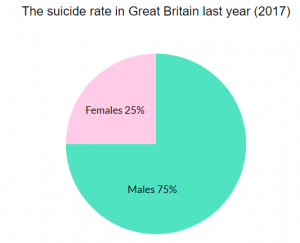
A Salford charity is aiming to break the stigma surrounding men’s mental health.
START Salford have identified this issue to raise awareness in the community.
Suicide rates are still three times higher in men than women. Men are also more likely to experience homelessness and drug abuse which are more prevalent in men.
Happy #InternationalMensDay
Men need to not feel stigmatised about speaking up about their mental health – #mensmentalhealth #speakout
— Em Long (@Emmajelina) November 19, 2018
Dennis Baldwin, a coordinator at START, believes that cultural beliefs about masculinity are holding men back from appealing for help until it’s too late.
“The issue is around stigma in terms of getting people to acknowledge that they have mental issues. Since we’ve started the reach out START suicide campaign, we’ve become more aware of the disparage and gender bias towards men in terms of suicide rates. This basically comes back to the issue around stigma.”
After receiving GP referrals, START are not seeing men until they are at “crisis point”.
“There is that stereotype of men having to be that strong, stoic type and see that stereotype through.”

Dennis believes the earlier the intervention, the better the support, making it easier to treat and diagnose their mental health.
“It’s about men not actually seeking the support as freely as women do. They’re not as open. They don’t have the support structures that women have in place…Men find it more difficult to talk about their feelings and emotions than women do.”

The key theme that Dennis emphasised was the need for men to be more open about their mental health and be aware that there is support to help them through it.
“A third of men with mental health issues didn’t disclose, or took over two years to disclose to family or loved ones that they were experiencing mental health problems. What you find is people are again leading to a crisis point until the support will finally kick in. We actually see men with better mental health and well being if we had the earlier intervention.”
“If they could openly talk about what they are experiencing, and seek and reach out for the help and support.”
Tobias Soar, a local student, openly admits to having suffered from mental health issues. He argues that men’s mental health is a major issue that society is yet to accept. The existence of traditional stereotypes around men have made it harder to speak out.
“Normally within the household, their family and friends will be less inclined to help simply because of the traditional stigma of that men have to be tough, men have to not show any emotions. They don’t have these issues. But they clearly do.”
Tobias articulately argues that if more mental health support was available, men could then break out from the stigma.
“Offering free therapy sessions and counselling to any man or woman that needs it, should be a priority set by the city council because that would really, not just improve lives, but save lives.”
However, it is not just the battle against traditional stigma attached to mental health that remains a concern, but the rise of social media.
Tobias adds, “In modern time, the current times we live in, men and women will usually compare themselves to the likes of others. When you combine this new era with traditional issue of patriarchal rules, when it comes together, it can be very problematic for men in particular.”
Education from an earlier age may be the way forward so that future generations, according to Tobias, can approach the issue with help and understanding.
If you want to find out more about mental health issues check out the NHS website.
Men aren’t allowed to have feelings.
Men are taught that emotion equals weakness.
Men are expected to be strong, so they suffer in silence.
70% of suicide deaths are men.
Let’s change that.#MHAP #MensMentalHealth #mentalhealth #EndTheStigma #SickNotWeak #KeepTalkingMH
— ? Life with Lyna ? (@CainKaleyna) September 27, 2018














Recent Comments